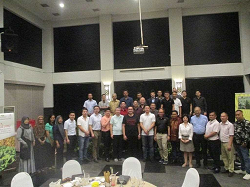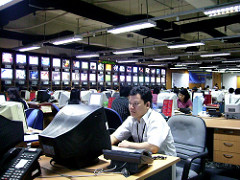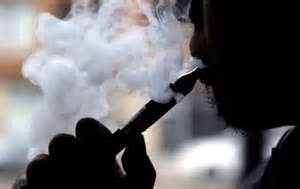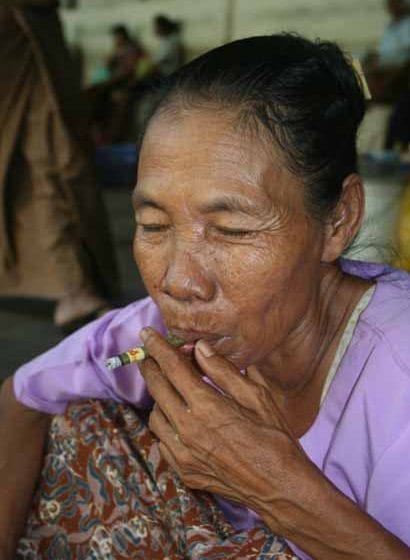E-liquids are to be the subject of a 57 percent excise tax in Indonesia from July 1, according to a story in The Neutral News.
Indonesia officially recognizes eight varieties of e-liquids, premium and non-premium, each of which retail in four sizes.
They range in price from Rp10,000 to Rp120,000.
Fifteen milliliters of premium e-liquid retails for Rp18,000, 30 ml for Rp35,000, 60 ml for Rp70,000, and 100 ml for Rp120,000.
Fifteen milliliters of non-premium e-liquid retails for Rp10,000, 30 ml for Rp20,000, 60 ml for Rp40,000, and 100 ml for Rp80,000.
Tag: Indonesia

Taxing progress

E-cigs attracting excise
Indonesia is due to impose an excise tax of 57 percent on certain e-liquids from July 1, according to a story by Tabita Diela for Reuters.
The tax is reportedly being imposed as part of efforts to curb tobacco-product consumption.
Sunaryo, an official with the Customs and Excise Office, was quoted as saying the e-liquid excise tax would be introduced as an expansion of the current excise tax rules governing tobacco products.
Tobacco accounts for the bulk of Indonesia’s excise taxes, which comprise a significant source of government revenue.
Sunaryo apparently said the new excise tax would apply only to e-liquids that contained “traces of tobacco plants”.
There are about 300 ‘unsupervised’ e-liquid makers in Indonesia, producing various liquids to supply more than 4,000 vape stores and 900,000 vapers, the customs office estimates.
Watching the weather
If weather conditions are normal this year, Indonesia should be able to produce up to 200,000 tons of tobacco, according to a story in Indonesia Investments.
The planting season is due to start in May provided the rainy season ends in April or early May.
Last year, the country is estimated to have produced 160,000 tons of tobacco, 129 percent more than the previous year’s production of 70,000 tons, which was hit by unusually wet weather during what is normally the dry season.
Meanwhile, Budidoyo Siswoyo, chairman of the Indonesian Tobacco Community Alliance (AMTI), has urged the government to encourage partnerships between local tobacco farmers and the cigarette industry.
Such partnerships would impact positively on the quality and quantity of the tobacco produced, and enhance the welfare of farmers, Siswoyo said.
One of the problems in the tobacco industry was that there existed a long line of middlemen between the cigarette industry and the small farmer, who wound up being paid low prices.
Star Tobacco expanding
Far East Leaf Indonesia (FELI), a wholly owned subsidiary of Star Tobacco International, has inaugurated its new headquarters in the former embassy building of the East Timor Consulate in the diplomatic suburb of Renon in Denpasar Bali.
A Star press note issued on Tuesday, said the event was attended by more than 20 major clients and 10 major suppliers of FELI.
‘FELI has been active in Indonesia over the past five years and has become a mainstream supplier to small and medium companies in the Java region,’ the note said. ‘This success can be attributed to FELI’s investment in infrastructure in tobacco storage depots in Jebel…’
The storage facility is said to carry a full range of imported Virginia, Burley and oriental tobaccos, as well as reconstituted tobacco and fines.
FELI is also a major exporter of Indonesian tobaccos to Star cigarette- and cigar-producing clients in Europe and Central America.
The inauguration (pictured) was hosted by Mehmet Ayyildiz, FELI’s vice president.
Meanwhile, earlier this month, Star Tobacco International announced the opening of its new headquarters in Istanbul, Turkey.
In a press note issued on Friday, Star said the previous building had become inadequate to support the growth of the company; so it had moved into a six-floor building.
The new building had enough space for 50 employees and included a conference floor and a social floor for the use of employees during their spare time.
The new headquarters is at: Mecidiye Mahallesi, Taş Basamak Sokak. No: 15 Beşiktaş-Ortaköy, İstanbul, Turkey.
More spent on TV adverts
Tobacco companies’ spending on advertisements in Indonesia fell by 17 percent between 2016 and 2017, according to a story in The Jakarta Post citing figures from Nielsen Indonesia.
But their spending on television advertising was up by 12 percent from 2016 to 2017, with television companies attracting 80 percent of the companies’ total advertising spend.
Spending on print advertising was down by an amount not specified in the story.
Of the total advertising spend across all industries in Indonesia, Rp145 trillion, tobacco companies spent about Rp5.4 trillion.
Nielsen Indonesia media research executive director Hellen Katherina said the total advertising spend in the country had increased by eight percent from 2016 to 2017.
The increase was said to have been driven by higher gross advertisement rates set by the media.
Taxing vapers
Indonesia has said that it will impose a 57 percent tax on non-tobacco alternatives to traditional tobacco cigarettes from the summer, according to a story in The Jakarta Post.
The announcement has sparked criticism that the government is siding with major tobacco companies at the expense of public health.
Electronic-cigarette cafés have been opening across Indonesia in recent years but the fear is that the new tax could strangle this nascent sector.
Rhomedal Aquino, spokesman for the Association of Indonesian Personal Vaporizers, was said to have told Agence France Presse that whereas his association agreed with using tax to control consumption, a 57 percent duty was too high. It would kill a growing industry.
“It will make us look like a killing machine when we’re not,” he said.
Meanwhile, Hasbullah Thabrany, a health expert and advisor to the National Commission on Tobacco Control, warned that while customs and excise law required that the government set taxes on such products, it was possible that the authorities were using the levy to take sides.
“I do believe that the policy sides with the [tobacco] industry,” he said.
The tobacco lobby in Indonesia is strong. The country’s trade minister Enggartiasto Lukita caused a backlash from anti-smoking groups in November when he suggested tobacco farmers would be hurt by the fledgling industry, and that those turning to e-cigarettes should smoke regular cigarettes instead.
“We should turn vapers into conventional cigarette smokers,” he said at the time.
Indonesia’s customs office said it hoped the tax hike would make e-cigarettes unaffordable for children, while the health ministry said it was not sold on the argument that vaping was safe. “E-cigarettes are just as dangerous and can be even more carcinogenic” than regular cigarettes, said senior ministry official Muhammad Subuh.
“We reject both conventional and electronic cigarettes — it’s better to quit smoking altogether,” he said. “There is no such thing as ‘less dangerous’ when it comes to smoking.”
Smoking creates poverty
Cigarette consumption is the second largest contributor to poverty in Indonesia, after rice consumption, according to a story in The Jakarta Post citing a National Development Planning Board (Bappenas) statement on Tuesday.
“People shouldn’t be dependent on such an unproductive habit,” Bappenas head and National Development Planning Minister Bambang Brodjonegoro was quoted as saying by tribunnews.com.
Bambang called on the people to stop the bad habit and start spending on more important commodities, such as meat, so they could provide their families with more nutritious meals.
He said the government would never support a decrease in cigarette prices; instead, it would increase prices by imposing a higher excise duty on cigarettes.
“As of September 2017, cigarette consumption contributed 9.98 percent to the poverty rate in urban areas and 10.70 percent in rural areas,” Bambang said.
The contribution of cigarette consumption to the poverty rate was said to have peaked in 2014 at 11.18 percent.
Local buying ‘encouraged’
Indonesia is planning to make the import of unmanufactured tobacco costlier than it has been to date, and to make it conditional on the importer’s buying local tobacco, according to a story in Indonesia Investments.
The country’s Co-ordinating Minister for Economic Affairs, Darmin Nasution, has confirmed that the government plans in 2018 to raise the import tariff on unmanufactured tobacco from its current level of five percent, though it is not known what the new rate will be.
Besides the higher import tariff, a number of new rules are being formulated that, in part, will require ‘importers/distribution centers’ to absorb a certain amount of locally-produced tobacco. Only those importers that obtain a recommendation letter from the Agriculture Ministry will be able to import tobacco, and this letter will be issued only to those companies that purchase ‘enough’ tobacco from local producers.
These regulations are reportedly aimed at improving the welfare of Indonesian tobacco producers and raising government revenues.
Currently, with a five percent import duty in place, Indonesian cigarette manufacturers are said not to be ‘encouraged’ to absorb locally-produced tobacco.
Based on data from Statistics Indonesia (BPS), the value of unmanufactured-tobacco imports into Indonesia during January-July 2017 was US$318.49 million, up 16.11 percent from that of the equivalent period of 2016.
Meanwhile, Indonesia’s cigarette production is thought to have risen to about 360 billion in 2017, from 342 billion during 2016.

Tobacco taxes healthy
Indonesia’s finance minister, Sri Mulyani, has suggested using revenue from the country’s tobacco excise tax to cover the health and social security agency’s (BPJS) annual funding shortfall of IDR9 trillion (US$664 million), according to a story by Coconuts Jakarta relayed by the TMA.
The reason given was that tobacco-related illnesses contributed to the deficit.
The story claimed that smoking prevalence in Indonesia might be as high as 70 percent among adult males.
Indonesia is said to suffer more than 200,000 tobacco-related deaths a year.
“Many people are sick due to smoking, so it’s logical that it should become one of the solutions, meaning using state revenue coming from tobacco products,” the finance minister said.
Boediarso Teguh Widodo, a director general at the ministry, estimated that government revenue from tobacco was about IDR14 trillion (US$1.03 billion) and of that about IDR5 trillion (US$369 million) could be earmarked for BPJS.

Let them smoke cigarettes
Indonesia’s Trade Minister has suggested that people who are unable to access vapor products should simply turn – or more likely, turn back – to regular cigarettes, according to a story by Vincent Bevins on washingtonpost.com.
Enggartiasto Lukita apparently issued his advice last week because the authorities are about to place prohibitive restrictions on the sale of electronic-cigarette ‘materials’.
New vapor-product legislation, which is due to go into effect in the next few months, will require vendors to seek a combination of special government licenses, which could take years to acquire.
“These are standards we’ll never be able to meet,” says Rhomedal, a spokesperson for Indonesia’s Personal Vaporizer Association, who, like some Indonesians, uses only one name.
“It will really hurt both small businesses and consumers in our sector.”
A growing number of Indonesians have been using e-cigarettes: people who, according to the minister – as reported by the local newspaper Kompas – can just “become regular smokers”.
Bevins described this as a ‘seemingly puzzling statement for a government official in a country where over 200,000 people already die of tobacco-related causes each year’.
‘But observers of politics in the world’s fourth most populous country say this is nothing new, and that because of the power of the tobacco industry here, Indonesia lags far behind rest of the world in controlling use, and suffers from severe health problems as a result,’ Bevins said.
Indonesia was the only country in the Asia-Pacific region that had not ratified the World Health Organization’s Framework Convention on Tobacco Control, and more than five million children smoked cigarettes, said Dr. Widyastuti Soerojo, head of the Tobacco Control Unit in the Indonesian Public Health Association.
However, this does not explain Indonesia’s puzzling stance on e-cigarettes given that the WHO has also opposed the use of these products; as is reflected in the negative attitudes to e-cigarettes of a number of countries in the Asia-Pacific region.








